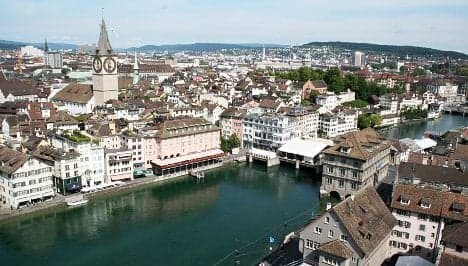Study: country-city divide replaces Swiss ‘Röstigraben’

The so-called Röstigraben – the traditional societal division between French and German-speaking Switzerland along linguistic lines – has decreased over the past decade as a new country-versus-city division emerges, according to a new study.
Shin Alexandre Koseki, a doctoral researcher in urban science at federal technology institute EPFL, analyzed the results of Switzerland’s federal referendums over the past 30 years.
He found that the perceived political divide between French and German-speaking parts of the country has been fading over the past decade.
Instead, voting habits are determined more by whether you live in a city or the countryside.
“Switzerland has become one big metropolis connected by its train lines,” said EPFL in a statement.
“The denizens of this metropolis have much in common and often vote in the same way.”
“In the 1980s, Swiss politics was marked by extensive fragmentation between language regions and cantons,” said Koseki. “The things people cared about varied widely from Geneva to Zurich.”
But that began to change in the 1990s, he found, and since 2000 the divide between the two major linguistic regions has been less apparent.
Instead, a growing polarization has emerged that pits the major Swiss cities, French-speaking Switzerland, Ticino and parts of the Graubünden against the suburbs and countryside in the German-speaking region.
Koseki puts this recent political alignment between cities down to the fact that people commute more, so there’s more interaction between people.
“People living in the big cities thus share the same interests and even the same values,” he said.
Rural communes in German-speaking Switzerland are among those most likely to disagree with the big cities, but vote similarly to each other, he added.
The country-city divide was apparent in the February 9th 2014 vote on the anti-immigration initiative.
While all of French-speaking Switzerland and the two biggest cities in the German part – Basel and Zurich – voted against limiting immigration, rural cantons including Aargau, Thurgau, Schwyz, Glarus and Uri were largely in favour of the idea.
One relative wild card is the Italian-speaking canton of Ticino, where voting patterns are more unpredictable, mainly due to the fact there is no one large cosmopolitan city, found the study.
Comments
See Also
Shin Alexandre Koseki, a doctoral researcher in urban science at federal technology institute EPFL, analyzed the results of Switzerland’s federal referendums over the past 30 years.
He found that the perceived political divide between French and German-speaking parts of the country has been fading over the past decade.
Instead, voting habits are determined more by whether you live in a city or the countryside.
“Switzerland has become one big metropolis connected by its train lines,” said EPFL in a statement.
“The denizens of this metropolis have much in common and often vote in the same way.”
“In the 1980s, Swiss politics was marked by extensive fragmentation between language regions and cantons,” said Koseki. “The things people cared about varied widely from Geneva to Zurich.”
But that began to change in the 1990s, he found, and since 2000 the divide between the two major linguistic regions has been less apparent.
Instead, a growing polarization has emerged that pits the major Swiss cities, French-speaking Switzerland, Ticino and parts of the Graubünden against the suburbs and countryside in the German-speaking region.
Koseki puts this recent political alignment between cities down to the fact that people commute more, so there’s more interaction between people.
“People living in the big cities thus share the same interests and even the same values,” he said.
Rural communes in German-speaking Switzerland are among those most likely to disagree with the big cities, but vote similarly to each other, he added.
The country-city divide was apparent in the February 9th 2014 vote on the anti-immigration initiative.
While all of French-speaking Switzerland and the two biggest cities in the German part – Basel and Zurich – voted against limiting immigration, rural cantons including Aargau, Thurgau, Schwyz, Glarus and Uri were largely in favour of the idea.
One relative wild card is the Italian-speaking canton of Ticino, where voting patterns are more unpredictable, mainly due to the fact there is no one large cosmopolitan city, found the study.
Join the conversation in our comments section below. Share your own views and experience and if you have a question or suggestion for our journalists then email us at [email protected].
Please keep comments civil, constructive and on topic – and make sure to read our terms of use before getting involved.
Please log in here to leave a comment.